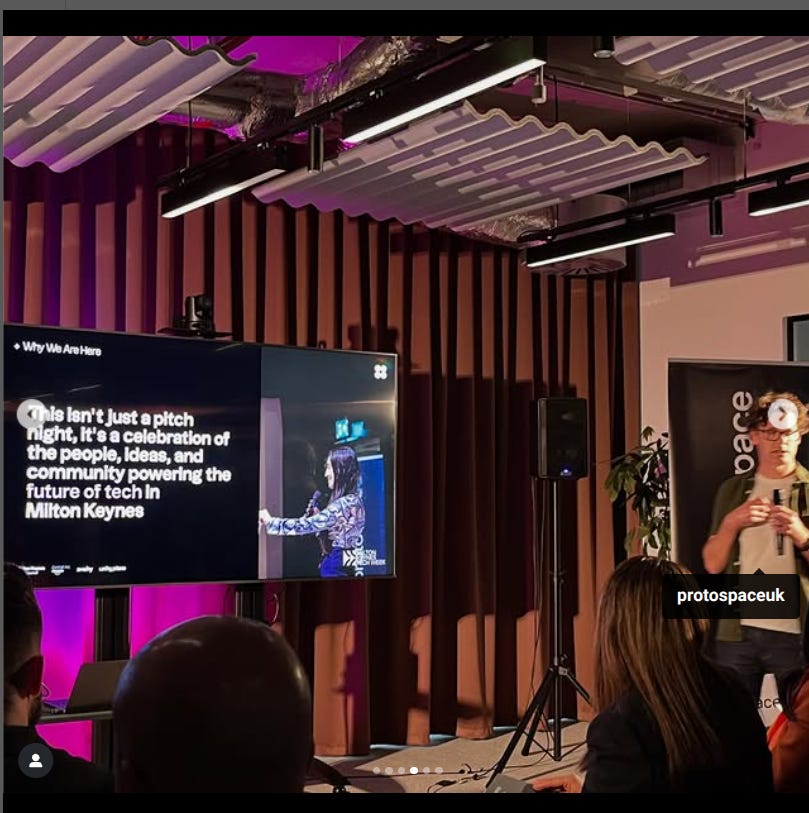It was Milton Keynes Tech Week, and I had the joy of closing the week with a live pitch event alongside my Protospace friends. The energy was electric. Ten founders, ten ideas, and almost every single one had a dash – or more accurately, a dollop – of artificial intelligence at its core.
Take just a couple of the winners - Nurmi, the sports coaching app using AI to build and deliver flexible training plans. Or FlexSR, developing an AI system that checks the accuracy of other speech recognition tools. These weren’t gimmicks – they were thoughtful uses of machine intelligence to do something genuinely useful. Still, it left me with a bit of a knot in my stomach.
Because I’m still not entirely comfortable living in an AI world. While I’m not quite at Luddite level of “burn the machines!”, the thought of outsourcing too much feels like losing something essential – the serendipity of error, the joy of imperfection, even the texture of struggle. And yet, I can’t deny how much these tools have started to help me.
The cliché is that AI is an input – the raw stuff that helps you find things, generate text, or polish a presentation. But the more I use it, the more I think its real power lies in assistance, particularly for my muddled mind.
Take Grammarly. For years, I refused to touch it, convinced it would sand down my sentences until they sounded like they belonged to someone else. I didn’t want to stop writing like me – scruffy edges, half-thoughts and all. But here we are: I still write like me, only now without the distracting typos that make me look as if I can’t spell my own name (thanks, Amy – you were right to beg me.) That’s not about input; it’s about letting my words arrive cleaner at the other end, and perhaps most importantly, it lets the reader see past the mistakes to the heart of what I’m (trying to) say.
Or email. I live in a semi-permanent state of panic about forgetting things – times, dates, meetings, messages — the administrative static of modern life. Recently, I started experimenting with email AI, and suddenly, the weight lifted. That “ahhh, crap, I’m sure I’ve forgotten to reply to something” weight is mostly gone, no longer meaning a week of shame and apologies. The cognitive load lightens. My shoulders drop.
Or the dreaded ChatGPT - I read context a lot - everything I say makes total sense to me. But my hit rate of things making sense to people is totally unpredictable. Nothing beats a human chatting things through with you (like Ollie saying “erm, I’m not sure these make any sense, what are you trying to get at”), but a “context checker” GPT is pretty decent second best.
These are small things, but small things matter. Particularly, I suspect that you’re neurodivergent.
Because here’s the rub: most people (and by most people, I include myself in that category) can’t always take the rough with the smooth. It’s easy to see “Michael is good at presenting”, but feel confusion at “How can michael lose the clicker during a presentation?” (True story about Friday: I hadn’t moved more than a few feet, and it still managed to disappear - I’d been so focused on what I was doing, everything else fell out of my head.) The brilliance is easy to celebrate, the frailty quietly confusing.
What AI can do – if we let it – is smooth the pebble. It doesn’t change who you are; it just rounds the edges so the brilliance can shine without snagging on the cracks. Perhaps the fight to strip out the unimportant details, or persuade people to look past the wrinkles, is too hard (I wish it weren’t, but it is). If AI can shoulder some of that, if it can buy us time to spend on the essential things – the things that actually matter – then perhaps that’s where its real value lies. People.
AI, at its best, is not the ghostwriter. It’s the spellchecker. Not the boss. The assistant.
And maybe that’s the opportunity for Milton Keynes too. To show the world not just how to use AI everywhere, but how to use it well. Not to erase our humanity, but to give us more of it back.
Peace, love, and happy Monday! (And huge thanks to the team that made MK Tech Week happen; you know who you are!)



